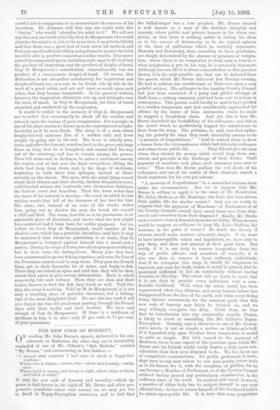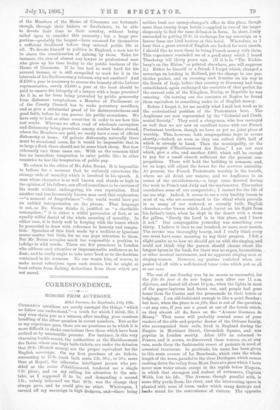THE NEW CODE OF HONESTY.
ON reading Mr. John Burns's speech, delivered to his con- stituents at Battersea the other day, one is irresistibly reminded of one of Mr. Gilbert's "Bab Ballads," entitled "My Dream," and commencing in this fashion :— "I dreamt that somehow I had come to dwell in Topsy-Tar- veydorn—
Where vies is virtue,—virtue, vice : where nice is nasty,—nasty, nice : Where right is wrong, and wrong is right, where white is black, and black is white," If only the new code of honesty and morality—which ap- pears to find, favour in the sight of Mr. Barns and other pro- gressive moralists—takes root among us, we may yet live to dwell in Topsy-Turveydom ourselves, and to find that the ballad-singer was a true prophet. Mr. Burns himself is well known as a man of the strictest integrity and honesty, whose public and private honour is far above sus- picion, so that there is nothing unfair in taking his ideas as to the causes of dishonesty, to be the typical opinion of the class of politicians which he worthily represents. Honesty and dishonesty, then, according to these gentlemen, are simply determined by the absence or presence of tempta- tion; where there is no temptation to steal, man is honest,— when temptation is put in his way, he is naturally dishonest. Although his own life is in direct contradiction to this peculiar theory, it is the only possible one that can be deduced from the speech which Mr. Burns delivered last Sunday evening. He had to address his constituents at Battersea upon a very painful subject. His colleague in the London County Council had just been convicted of a petty and pitiful attempt at theft from a railway company, and had been sent to prison in consequence. This person could hardly be said to have yielded to a sudden temptation, and had considerably aggravated his offence by the tissue of false statements which he made to support a fraudulent claim. And yet this is how Mr.. Burns described the backsliding of his colleague ; and this is the moral which he particularly begged his constituents to draw from the story. The prisoner, he said, was then suffer- ing the penalty for what they must charitably assume to be " a, moment of forgetfulness." "And he wished them to draw a lesson from the circumstances which had driven his colleague and others from public life They did not give the men whom they elected the money which would keep them con- sistent and patriotic in the discharge of their duties, Until payment of members took place, such instances were sure to recur." Thus does Mr. Burns palliate the evil deeds of his colleagues, and out of the nettle of their disasters snatch a fresh argument for his own pet scheme.
"A moment of forgetfulness" is a somewhat curious term under the circumstances. Are we to suppose that Mr. Burns is willing to apply it to the cases of Mr. Henderson, Mr. Jabez Balfour, or Mr. Hastings, who have also been driven from public life for similar causes P And are we really to suppose that the payment of Members—of Parliament or of the County Council—would have saved these men from ship- wreck and ourselves from their disgrace P Really, Mr. Burns makes rather a heavy demand upon our credulity. What income would he suggest as sufficient to keep Mr. Jahez Balfour, for instance, in the paths of virtue P No doubt the theory, if correct, would make matters extremely simple. If we want to have incorruptible rulers and legislators, we have only to- pay them, and then rest assured of their good faith, But surely, if it is our duty to remove temptation from the way of public officials and members of councils, it is also our duty to remove it from ordinary individuals.. And if we recognise this duty, it would be iniquitous to imprison any man for theft, unless it could be proved that he possessed su.fficient to live on comfortably without having recourse to thieving. The retort will no doubt be made that it is our duty to provide every individual with a com- fortable livelihood. Well, when the whole world has been regenerated, when vice, idleness, and every human failure has disappeared from the face of the earth, and when every living being labours strenuously for the common good, then this, new code of honesty may fairly be insisted on, and we may willingly recognise our duty. Until then, we fear that its introduction into any community outside Utopia, is likely to result in something like Mr. Gilbert's Topsy. Turveydom. Honesty, Hays a character in one of Mr. Steven- son's novels, is not as simple a matter as blindman's-buff. If it depended only upon freedom from temptation, it would be quite as simple. But with regard to the payment of Members, there is one aspect of the question upon which Mr. Burns and his friends might really bestow a little more con sideration than they seem disposed to do. We live in an age of competitive examinations. No public profession is nowa- days open to any man unless he can pass pretty severe tests as to his fitness for it, with the exception of politics, for he can become a Member of Parliament or of the County Council without having passed any preliminary examination, in the ordinary sense of the word. As matters now stand, however, a member of either body has to subject himself to one very efficient test,—he has to assure himself of his livelihood before he enters upon public life. It .is true that some proportion of the Members of the House of Commons are fortunate enough, through their fathers or forefathers, to be able to devote their time to their country, without being called upon to consider this necessity ; but a large pro- portion—probably the largest—have amassed for themselves a sufficient livelihood before they entered public life at all. To devote himself to politics in England, a man has to be above the consideration of gaining by them. Take, for instance, the case of almost any lawyer or professional man who gives up his time to-day to the public business of the House of Commons. If he has had to work hard for his assured income, or is still compelled to work for it in the intervals of his Parliamentary labours, why not another P And if £300 a year is necessary to ensure the honesty of the Labour representative, surely £3,000 a year at the least should be paid to ensure the integrity of a lawyer with a large practice P As it is, so far from being protected by public generosity from dishonest temptations, a Member of Parliament or of the County Council has to make pecuniary sacrifices, and so give a substantial proof of his disinterestedness and good faith, before he can pursue his public avocations. We have only to look at other countries in order to see how this test works. Whereas we often read of wholesale corruption and dishonesty being prevalent among similar bodies abroad, where the Members are paid, we rarely have a case of official dishonesty at home. Of private dishonesty, naturally there must be occasional cases, for it would be impossible that in so large a flock there should not be some black sheep. But how extremely rare these cases are. With us the common thief has no immediate temptation to enter public life; in other countries he has the temptation of public pay.
To return to the ethics of Mr. John Burns. It is impossible to believe for a moment that he seriously entertains the strange code of morality which is involved in his speech. A man whose character is so well known and stands so high in the opinion of his fellows, can afford sometimes to be careless of his words without endangering his own reputation. Had another and less favourably known man used that euphemism —"a moment of forgetfulness "—the world would have put an unkind interpretation on the phrase. That language is not, as Mr. Burns thinks it, justified as "a charitable assumption ; " it is either a wilful perversion of fact, or an equally wilful denial of the whole meaning of morality. In either case, it is fairly well in keeping with the lesson which he proceeded to draw with reference to honesty and tempta- tion. Speeches of this kind made by a reckless or ignorant orator matter but little, for no one pays attention to them. But Mr. Burns occupies much too responsible a position to indulge in wild words. There are few preachers in London who address such attentive or impressionable audiences as he does ; and he really ought to take more 'heed as to the doctrine contained in his sermons. No one wants him, of course, to make moral reflections upon such stories, but he might at least refrain from Making deductions from them which are not moral.



































 Previous page
Previous page